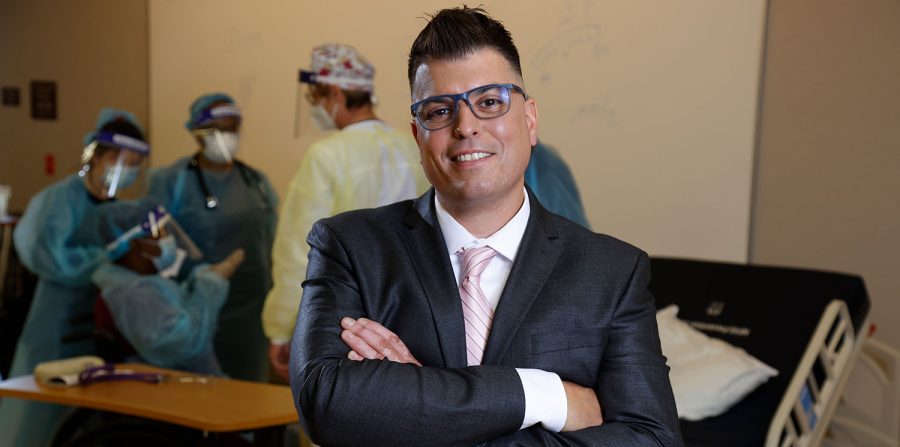San Diego Community College District Chancellor Carlos O. Cortez hosted a forum on campus on Nov. 16 where he and several members of the chancellor’s cabinet addressed district plans for the 2022-23 academic year.
Topics of discussion included the need to increase enrollment, funding, reorganization, and advertising. Chancellor Cortez noted basic skills and remedial education have been cut drastically in the last couple of years which has significantly contributed to their challenges with enrollment management.
The district states its mission is to provide access to high-quality, affordable learning experiences to the San Diego community and state. The chancellor highlighted this statement saying, “our mission should always be our north star which guides our work.”
He explained it helps determine how to allocate resources and what types of facilities and faculty are needed.
The main source of funding for SDCCD is FTES or full-time equivalent students-those taking 15 units in a semester. The district gets paid accordingly but how they get paid has changed. A new funding formula has decided the district will have to earn more money rather than receive it. According to Cortez, this can be done in two ways: the types of students they serve and how students perform their outcomes.
At first, the goal was to get students in the front door but Chancellor Cortez described it as having shifted to completion. This also changes how the district gets funded. Right now, they receive around two-thirds of the 30% of funding. Chancellor Cortez expressed great confidence in the strides that will be taken to capture the full 30%.
Chancellor Cortez pointed out that the campus life here at Mesa College makes it particularly special. He followed by explaining there is, however, a decline in male student enrollment and there should be efforts made to reverse it.
He pointed out the upcoming resident FTES targets are slightly lower than what is guaranteed by the state. The target is to get back as close to it as possible but because they currently are not reaching that target, bold efforts to meet it are going to have to be made.
The passing of Assembly Bill 927 (Medina) made 15 pilot programs permanent including the Mesa College 4-year degree Cortez said.
He explained the district has been moving forward with Open Educational Resources (OER) and Zero Textbook Costs (ZTC) and has received multiple grants.
According to the presentation, “during Fall 2021, 36% of course sections were using low-cost, no-cost, and Open Educational Resources (OER).” Along with other saving measures, over $3 million has been saved districtwide.
Executive Vice Chancellor Bonnie Dowd discussed budget and finance. She said Proposition 98 is the main source of funding. It guarantees 40% of the funding goes towards education. She explained a large amount of federal money has come through the district’s system. Most of that money goes out directly and indirectly to students. She emphasized that “colleges don’t get funded, districts get funded.” The district distributes from there.
Restricted money or grants must be used accordingly and in a timely manner. Reserve money is not enough so it is strongly recommended districts take firm efforts to save reserves.
Vice Chancellor Gregory Smith presented on district office reorganization and technology services. He highlighted their guiding principles and emphasized they need to, “achieve strategic goals efficiently, effectively, and equitably.” They want to create conditions where employees are able to perform their best work possible and explore ways to align things differently for operational efficiency.
Smith also said Human Resources is now known as “People, Culture, and Technology Services.” He elaborated that the new title was intentional- “we serve people, the whole person and in the way that we do that we set a tone for what the culture of our institution is going to be.”
This also allowed for the introduction of technology services which can allow for better automation resulting in more time to serve people instead of time spent on data entry.
Vice Chancellor Joel Peterson discussed departmental changes and initiatives as well as housing. He expressed he wants his area of responsibility to be very focused on services. Peterson explained diversity, equity, and inclusion are key initiatives. Others included sustainability and transparency.
Peterson presented an affordable housing model for faculty and staff for City College as part of an overall look at housing for the entire district.
Lastly, Director of Communications and Public Relations, Jack Beresford talked about districtwide communications and public relations.
Beresford said the campaign to get more students back on campus post-pandemic has evolved from, “Your future starts here” to “Careers start here.”
“The thing we can do best for our students is really connecting them with good paying jobs,” Beresford expressed.
Stronger advertising efforts within the community have also been made in order to recruit more students. This includes online advertisements, commercials, and billboard signs.
These efforts are in hopes higher enrollment levels will occur and more funding can be secured.


